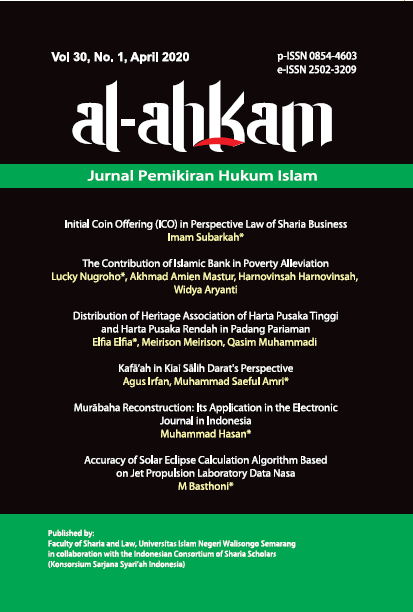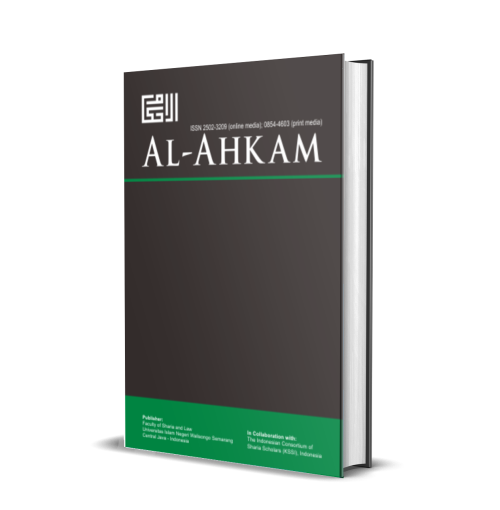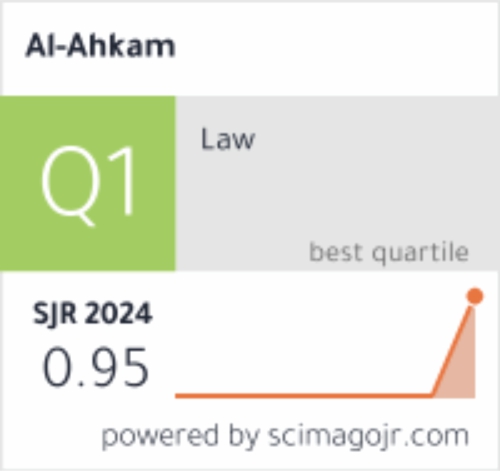Initial Coin Offering (ICO) in Perspective Law of Sharia Business
DOI:
https://doi.org/10.21580/ahkam.2020.30.1.4701Keywords:
Initial Coin Offering (ICO), crypto money, maṣlaha mursala, maqāṣid al-sharī’aAbstract
Tixl (TXL) is a crypto money project that uses Initial Coin Offering (ICO) to fund its development phase. Various problems underlying the existence of Tixl (TXL) and the proposed solutions are closely related to the condition of society in the information technology era. This study aims to determine the various factors underlying the use of ICO as a way to raise funds, examine Tixl (TXL) as a crypto money project and its position in public life which is reviewed in the perspective of the maṣlaḥa mursala, and token sales transactions in ICO organized by Tixl gmmbH in the perspective of Islamic treaty law. This research is a library research using a conceptual approach and qualitative analysis techniques. This paper shows that there are three factors underlying the use of ICOs as a way to raise funds, namely a change in orientation in the business model, tokenization, and characteristics of business activities. As a crypto money project, Tixl (TXL) cannot provide benefits that are comprehensive or kully, even the harm caused is greater than the benefits. Transaction of token sales in ICO held by Tixl (TXL) is a transaction that is damaged because it is contrary to maqāṣid al-sharī'ah.
Downloads
References
Anwar, Syamsul. Hukum Perjanjian Syariah. Jakarta: RajaGrafindo Persada, 2010.
Cura Network. ‘Cura Network- We Are Pulling the Plugs on Our ICO Campaign’, 5 May 2019. https://medium.com/cura-network/cura-network-we-are-pulling-the-plugs-on-our-ico-campaign-9d2dfdbeb02e.
Dannen, Chris. Introducing Ethereum and Solidity. New York: Apress, 2017.
Darmawan, Dimaz Ankaa Wijaya; Oscar. Blockchain dari Bitcoin untuk Dunia. Jasakom, 2017.
Dell’Erba, Wulf A. Kaal; Marco. ‘Initial Coin Offerings — Emerging Practices, Risk Factors, and Red Flags’, 27 October 2017. https://medium.com/@wulfkaal/initial-coin-offerings-emerging-practices-risk-factors-and-red-flags-26c41e61a332.
Djazuli, A. Kaidah-Kaidah Fikih: Kaidah-Kaidah Hukum Islam dalam Menyelesaikan Masalah-Masalah yang Praktis. Jakarta: Kencana, 2001.
Effendi, Satria. Ushul Fiqh. Edited by M. Nurul Irfan Aminuddin Ya’kub. Jakarta: Kencana Prenada Media Group, 2008.
Eichinger, Christian, Christian@tixl Me, Sebastian Gronewold, Sebastian@tixl Me, Bernd Strehl, and Bernd@tixl Me. ‘Tixl Whitepaper’, 2019. https://medium.com/tixlcurrency/tixl-token-sale-phase-3-official-start-41a9f0ee504c.
Al-Haritsi, Jaribah bin Ahmad. Fikih Ekonomi Umar Bin Al-Khathab. Edited by Asmuni Solihan Zamakhsyari. Jakarta: Khalifa, 2006.Hulam, Taufiqul. ‘Jaminan dalam Transaksi Akad Mudharabah pada Perbankan Syariah’. Mimbar Hukum 22, no. 3 (2010).
Kelly, Brian. The Bitcoin Big Bang. Jakarta: PT Elex Media Komputindo, 2018.
Nakamoto, Satoshi. ‘Bitcoin: A Peer-to-Peer Electronic Cash System’, n.d. www.bitcoin.org.
Rosyid, Maskur. Implementasi Konsep Maslahat Al-Ṭūfī dalam Fatwa MUI (2005-2010). 1st ed. Magelang: Ngudi Ilmu, 2013.
Rosyid, Maskur. ‘Merealisasikan Kemaslahatan; Membaca Ulang Metodologi Fatwa MUI’. In Peran MUI dalam Berbangsa dan Bernegara, edited by M. Asrorun Ni’am Sholeh, 41–57. Jakarta: Komisi Fatwa Majelis Ulama Indonesia, 2018.
Sahroni, Adiwarman A. Karim dan Oni. Riba, Gharar dan Kaidah-Kaidah Ekonomi Syariah Analisis Fikih dan Ekonomi. Jakarta: RajaGrafindo Persada, 2015.
Satis Group. ‘Cryptoasset Market Coverage Initiation: Network Creation’, 2018.
Suratmaputra, Ahmad Munif. Filsafat Hukum Islam Al-Ghazali: Maslahah Mursalah & Relevansinya dengan Pembaharuan Hukum Islam. Jakarta: Pustaka Firdaus, 2013.
Zahrotunnimah. ‘Kebebasan Beragama Bagi Kaum Muslimin di Negeri Jerman’. ‘Adalah: Buletin Hukum & Keadilan 3, no. 1 (2019).
Zayd, Muṣṭafā. Al-Maṣlaḥah fī al-Tashrī’ al-Islāmī wa Najm al-Dīn al-Ṭūfī. Dār al-Fikr al-‘Arābī, 1954.
Downloads
Published
How to Cite
Issue
Section
License
By submitting an article to the journal, the author(s) agree to transfer the published article's copyright to the journal, which will act as the publisher. This means the journal will have the right to publish the article in various forms, including reprints. The journal will maintain the publishing rights to the published articles.
In line with the license, authors and third parties (readers, researchers, and others) are allowed to share and adapt the material. In addition, the material must be given appropriate credit, provided with a link to the license, and indicated if changes were made. If authors remix, transform or build upon the material, authors must distribute their contributions under the same license as the original.




